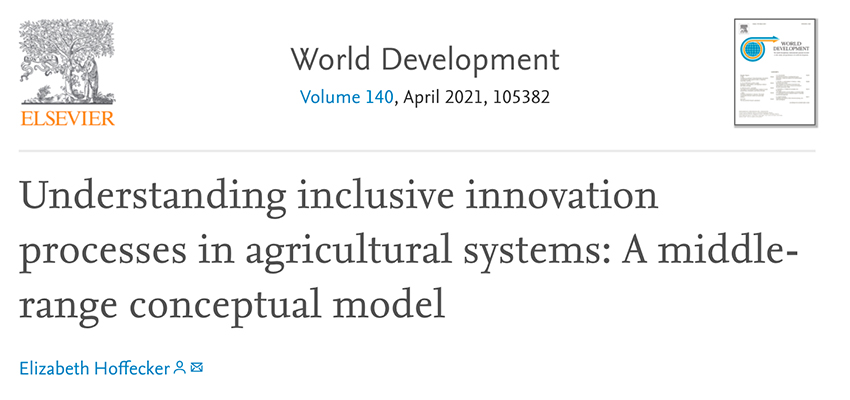
Published in World Development, Volume 140, April 2021
Abstract
Inclusive innovation as a strategy for inclusive development has received increased attention from development policymakers, practitioners, and scholars in recent years. What these processes entail in practical terms, however, remains contested and under-theorized. This paper addresses the scarcity of mid-level analysis and models of inclusive innovation processes within complex systems, which are needed to enable a coherent empirical research agenda and to inform program theory-building, implementation, and evaluation. Looking to smallholder-oriented agricultural systems in the Global South, where the majority of inclusive innovation implementation and research has been located, this paper proposes that it is possible to identify the essential features and causal logic of these processes to create an empirically-derived, middle-range model with cross-context applicability. Drawing on methods from realist evaluation and social inquiry, I conducted a theory-driven, cross-case synthesis of three studies of inclusive innovation processes in agricultural systems, with one case each from South America, Southeast Asia, and Africa. I find that despite significant diversity in project designs, facilitation approaches, and local contexts, the three inclusive innovation processes unfolded in strikingly similar ways, and that this modus operandi can be modeled as a middle-range theory of change. In each case, I find that a consistent set of activities and processes changed the local context for the inclusive innovation initiative. These altered contextual factors interacted with ongoing programmatic activities in consistent ways to trigger processes of social learning, social capital strengthening, collective cognition, and consensus formation, which acted as causal mechanisms responsible for producing the intermediate outcomes that led to technical, organizational, and institutional system innovation. The middle-range model enables cross-context insights into how inclusive innovation processes work and what capacities are needed to facilitate them. It can also guide the adaptive management and assessment of these processes, while offering testable hypotheses to guide future empirical work and evaluation.
More information
Investigating Inclusive Systems Innovation project
Contact
Elizabeth Hoffecker, MIT D-Lab Research Scientist; Lead, Local Innovation group

